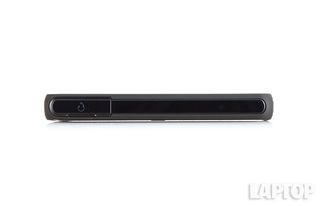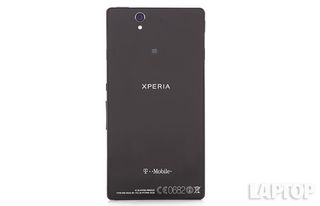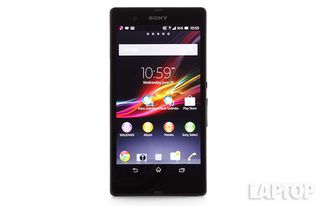Laptop Mag Verdict
The water-resistant Sony Xperia Z features a water-resistant design, an excellent camera and fast speeds on T-Mobile's new LTE network, but we wish the screen had wider viewing angles.
Pros
- +
Design shrugs off water
- +
Excellent 13-MP camera
- +
Floating apps come in handy
- +
Vivid screen
Cons
- -
Boxy design makes one-hand use difficult
- -
Narrow viewing angles
- -
Back gets hot
- -
Slower CPU than HTC One and S4
Why you can trust Laptop Mag
T-Mobile customers now have an embarrassment of riches: In addition to the Samsung Galaxy S4, HTC One and the iPhone 5, the carrier now offers the Sony Xperia Z. Available for just $99 up front, Sony's latest smartphone sports a bright 5-inch 1080p display, two excellent cameras that can shoot video in HDR and access to T-Mobile's new LTE network. Plus, the phone is water-resistant, making it more durable than other flagship devices.
[sc:video id="dvNHE1cTp3LF6lfw-r-GSehDlngLtDxV" width="575" height="398"]
Design

Click to EnlargeIf you were to take the Sony Xperia Tablet Z and shrink it down into a handheld size, you'd end up with the Xperia Z phone. Both the front and back are made of a durable black glass that's reminiscent of the iPhone 4S, but picks up fingerprints fairly easily. Also like the iPhone, it's a very square design that would be more uncomfortable to hold if it weren't for the slightly rounded edges.
The whole Xperia Z is black and has a few chrome highlights, including the circular power button about two-thirds the way up on the right side (Sony says it's ideally placed for left- and right-handed users) as well as a ring around the rear-facing camera, and logos on the front and back.
We like the fact that the front-facing camera is at the top of the phone, instead of the bottom, like the Xperia ZL.

Click to EnlargeThe top edge of the phone has a 3.5mm headphone jack, the right side (just above the power button) has a SIM card slot, and the left edge has a microUSB port and a microSD card slot. All have port covers that blend perfectly into the Xperia Z's edges. Aside from aesthetics, these covers also make the Z water-resistant; like the Tablet Z, you can submerge the phone in up to 3 feet of water for 30 minutes.
Our review unit was all black; a purple version will be offered online only, but in limited quantities.
At 5.47 x 2.79 x 0.31 inches, the Xperia Z is taller and wider than the Samsung Galaxy S4 (5.31 x 2.69 x 0.25 inches), which also has a 5-inch display. This makes the phone more difficult to use with one hand; we sometimes has to reposition the device to reach certain items with our thumb.
MORE: Sony 2013 Rating: Best and Worst Smartphone Brands
At 5.2 ounces, the Xperia Z is heavier than the 4.6-ounce S4 and the 5.1-ounce HTC One. However, it's a touch lighter and thinner than the Samsung Galaxy S4 Active (5.5 x 2.8 x 0.4 inches, 5.4 ounces), another water-resistant phone.
Water-Resistance
The Xperia Z is one of a few devices that you don't have to worry about getting wet. Like the Samsung Galaxy S4 Active, you can dunk the Xperia Z in up to 3 feet of water for 30 minutes -- helpful if you're accident-prone, or simply don't want to worry about it when you hang out by the pool.
The phone made it through being submerged, although you can't use the touch screen when it's underwater. So, if you want to record a video, you'll have to start filming above water. The S4 Active, by comparison, has an Aqua Mode that lets you take stills by pressing the volume button.
However, we were able to stream music from a submerged Xperia Z to a speaker via Bluetooth, which is a pretty neat trick.
Display and Audio

Click to EnlargePowered by its Mobile Bravia Engine 2, the 5-inch, 1080p display on the Xperia Z looks amazing -- when viewed head-on. The Bravia Engine 2, as also seen on the ZL, improves picture quality through real-time contrast optimization, color management and noise reduction. Turning this feature off -- it's on by default -- makes images seem a duller, but not by much. A high-def trailer for "Pacific Rim" looked awesome. Colors across the spectrum, from reds and oranges in explosions to the blues of the ocean, were vivid and saturated.
However, like the ZL, as soon as you angle the Z's screen away from you, the display takes on a milky cast. We're not sure why Sony can't source LCDs with wider viewing angles.
Like the ZL, the Z packs in 443 pixels per inch, which is higher than the Galaxy S4's 441 PPI, but less than the HTC One's 468 PPI.
Click to EnlargeWith an average brightness of 365 lux, the Z is comfortably above the category average of 294 lux, but below the HTC One (439 lux), Samsung S4 (460 lux) and the iPhone 5 (525 lux).
A small speaker on the lower right-hand edge of the Z pumped out sound that was loud, but easily muffled when we were holding the phone in our right hand.
Keyboard

Click to EnlargeSony's Xperia keyboard is similar to that of a stock Android keyboard, but includes a Swype-like trace feature. We like that when you first start the phone, the Z asks you how you want to customize the keyboard (of course, you're free to change these settings at any time).
Click to EnlargeThe Xperia's keyboard provides three layout options: a standard QWERTY keyboard that requires you to press a dedicated button to access numbers and symbols, a version that enables long-presses to enter numbers and symbols and a flip-phone-style number pad layout.
The Xperia Z's keyboard also has haptic feedback, which is more pronounced than that on the Samsung S4; it can become distracting if you start typing at a fast pace, but you can turn this feature off.
MORE: 5 Best Keyboard Apps for Android
Interface
Click to EnlargeSony lightly skins Android Jelly Bean 4.1.2 on the Xperia Z. As it doesn't have Android 4.2, you're not getting features such as actionable notifications, quick settings (although Sony supplies its own) and wireless mirroring.
When you drag your finger down the lock screen, it has a cascade effect, akin to rippling your hand down a venetian blind. Here, you can unlock the phone to the home screen, to the camera or to music. Unfortunately, you can't customize which app shortcuts appear on the lock screen. It's a bummer, considering both the S4 and the HTC One let you do this.

Click to EnlargeOnce unlocked, the bottom of the display has three soft-touch buttons (Back, Home and Task Manager), above which are icons for the Chrome browser, Camera, Apps, Messages and the Phone.
Dragging down from the top reveals notifications; we like that it displays how close you are to reaching the limits on your plan. Above this are quick settings for the speaker, Bluetooth, Wi-Fi, GPS and the Settings menu. While we don't need as many as on Samsung's TouchWiz, we would like to be able to change the screen brightness and activate Airplane Mode from here.
MORE: Best Android Security Apps 2013
Performance

Click to EnlargeWith a 1.5-GHz Quad Core Snapdragon S4 pro processor, 2GB of RAM and 16GB of storage, the Xperia Z is peppy, but not as fast as other top-tier smartphones. On the plus side, opening apps and navigating through menus was fast, and playing "Riptide: GP" was smooth, complete with on-screen splash animations.
When it came to synthetic tests, the Z lagged behind other flagship devices. On Quadrant, the Xperia Z's score of 7,837 was well above the category average of 4,131, but far below the HTC One (11,573), the Galaxy S4 (12,251) and the S4 Active (12,648).
On the 3DMark Ice Storm graphics test, the Xperia Z's score of 10,304 was about 1,400 points higher than average, but 500 points less than the Galaxy S4 (10,842) and the HTC One (10,882). The Galaxy S4 Active on AT&T scored an even higher 11,173.
Using the more demanding Ice Storm Extreme test, the Z's score of 6,002 was about 500 points higher than average (5,487), but again trailed the HTC One (6,147), the S4 (6,559) and the S4 Active (6,650).
The Xperia Z comes with 16GB of storage built in, but can be expanded by 32GB using a microSD card.
Apps
Click to EnlargeAlthough the phone accesses Google Play, the Xperia Z also comes with Sony Select, Sony's curated Android app store.
Sony also packs in a number of its apps on the Xperia Z. Music Unlimited and Video Unlimited let you rent or purchase music and movies. The Premium version of Music Unlimited costs $9.99 per month, and lets you stream and download songs to any device with the app installed. Movies on Video Unlimited cost anywhere from $3.99 to rent to $14.99 to buy.
Walkman lets you play music stored on the Xperia Z, from Music Unlimited, or even from networked storage devices. We especially liked that the app instantly recognized all the music in our network-attached storage device. The Movies app acts in much the same way, albeit for videos, and Album lets you view photos saved on the tablet, as well as on Picasa, Facebook and any network-attached storage devices.
SocialLife is a news-aggregation app, similar to Flipboard, which pulls in the latest content from a variety of sources, including Facebook.
T-Mobile apps include T-Mobile HotSpot, T-Mobile TV, Visual Voicemail and T-Mobile My Account, which you can remove from the home screen, but can't delete.
Small Apps
Click to EnlargeLike the Xperia Z tablet, the Xperia Z phone also has so-called Small Apps, little apps that float in windows above other apps, much like the pop-up play feature on Samsung Galaxy S4.
Pressing the multitasking button on the home screen reveals a tray at the bottom of Small Apps. Calculator, Timer and Browser are preloaded, but there are about 40 available in the Google Play store, and include everything from a flashlight to an RSS reader to a camera app.
We like that the windows are resizable, but you can only have one Small App on screen at a time. While it works, this feature is not quite as useful as the Galaxy S4's Multiwindow Mode.
Cameras
[sc:video id="V0ZDFncTp32bSDZVbWZXQSIuvVOhi--G" width="575" height="398"]

Click to EnlargeFrom a company with plenty of experience with photography, it's no surprise that the Sony Xperia Z has a robust camera. The rear-facing 13-MP camera uses Exmor-RS technology and can shoot video in 1080p. What's more, HDR Mode is available for both stills and video. By comparison, the rear-facing camera on the S4 has a 13-MP sensor and the S4 Active has a resolution of just 8 MP.
Click to EnlargeMore than just the hardware, though, the Xperia Z comes with Sony's robust camera app, which includes many of the features you'd find on its digital cameras.
Superior Auto+ Mode uses scene detection to automatically pick the best settings, no matter the shooting condition, and automatically uses noise reduction and HDR. We found it worked well for the most part, but when we tried to take a close-up of some flowers, it wouldn't switch to Macro Mode. We had to go into the manual Scene selection so that the camera would focus on the flowers.

Click to EnlargeBurst Mode lets you take photos up to 9 MP at 10 frames per second; we were able to capture several shots of a colleague's swing during his at-bat at a company Wiffle ball game, even getting the moment when he made contact with the ball.
Panorama Mode worked somewhat well, getting a full 180-degree shot of an outdoor festival. However, the camera app had a lot of trouble inside a darkened arena. We got an error message that we were either moving the camera too slowly or too quickly and were never able to get a good picture.
MORE: Smartphone Camera Shootout 2013
The front-facing 3-MP shooter is no slouch, capable of taking 1080p stills and video. If you want to use HDR, its max resolution drops to 1.8 MP, which still isn't bad. When we took a selfie, colors, such as the blue of our shirt and the color of our eyes, were rich, and we could make out the few strands of gray on our head. We did notice a little bit of visual noise, though.
NFC
Just below the rear-facing camera is an NFC chip, which allows you to touch the Xperia Z to other NFC-enabled devices to link them wirelessly. One such accessory is the Sony SVH-20 Bluetooth dongle ($49), which attaches to wired headphones or an existing set of speakers. After activating NFC and Bluetooth, we started playing music on the Xperia Z. Then, we held the back of the phone to the SVH-20; after a moment, the phone buzzed gently, and an on-screen message asked if we wanted to play music on the accessory. After pressing yes, the song played through the dongle in an instant.
When we wanted to play music on the phone, we simply touched the two devices together again.
4G LTE
Click to EnlargeThe Xperia Z is the 11th phone that can take advantage of T-Mobile's nascent LTE network. Otherwise, it falls back to the carrier's HSPA+ 42 network. T-Mobile's LTE network is officially available in Houston, Kansas City, Mo., Las Vegas, Phoenix, San Jose, Baltimore and Washington, D.C. By comparison, Verizon's LTE network covers 500 markets, and AT&T's LTE network is available in 326 markets.
Although it's still being tested in the New York City area, we did find one coverage area in downtown Jersey City, N.J. Using Speedtest.net, we averaged 11.6 Mbps down and 8.2 Mbps up. However, T-Mobile's network, unburdened by other users, is capable of much higher throughput. While riding the PATH train between Journal Square and Harrison, N.J., we saw download speeds as high as 28.4 Mbps and upload speeds around 9.2 Mbps.
It took an average of 8 seconds to load the full desktop version of ESPN.com, 6 seconds to load laptopmag.com and 8.3 seconds to load the desktop version of The New York Times.
Heat
When you're using its wireless radios, the Xperia Z gets pretty hot. After just a few minutes of surfing the Web and using apps such as Speedtest.net, the upper back of the phone (near the camera and NFC spot) reached 108 degrees Fahrenheit.
Battery Life
Click to EnlargeOver T-Mobile's LTE network in Jersey City, the Xperia Z lasted 6 hours and 36 minutes on the LAPTOP Battery Test (Web surfing via LTE). That's about 30 minutes longer than the smartphone average (6:08). However, the T-Mobile Galaxy S4 tested in the same location lasted 6:44, and the T-Mobile HTC One lasted 8:17. Still, the Sony beat out the S4 Active, which lasted 5:45 on AT&T's LTE network.
You can prolong the Z's battery life by engaging Stamina Mode, which disables background processes while the screen is turned off. With this mode on, our estimated standby time went from 12 hours to 3 days. However, if you want to still get email and messages pushed to the phone while the screen is off, you can whitelist apps to keep updating.
MORE: 10 Smartphones with the Longest Battery Life
Call Quality
The Xperia Z supports T-Mobile's HD Voice technology, which promises clearer calls -- so long as the person on the other end has an HD Voice-enabled phone. When we called a colleague who had a T-Mobile Samsung Galaxy S4, her voice was so clear she could have been standing next to us. Unfortunately, we could also hear background noise equally clearly, which proved distracting.
Currently, T-Mobile phones that support HD Voice include the iPhone 5, the HTC One, the Google Nexus 4, the BlackBerry Q10 and Z10, Galaxy Note II, LG Optimus L9, Galaxy S III and the Galaxy S Blaze.
Pricing and Value

Click to EnlargeConsumers can purchase the Xperia Z for an initial payment of $99 down, and then 24 payments of $20 per month. If you'd rather get it all out of the way at once, you'll pay $579.
An individual plan starts at $50, and includes unlimited talk and text and 500MB of data per month. T-Mobile charges $60 per month for a 2.5GB data plan that also includes unlimited talk and text. If you add in the cost of the device, you'd wind up paying $2,020 over two years. If you go over that data limit, T-Mobile will throttle, but not cut off, your data service. The Unlimited Nationwide 4G plan costs $70 per month, and also includes up to 500MB of hotspot service. If you choose the unlimited plan, it will end up costing you $2,259 over the course of two years.
Both the iPhone 5 and Galaxy S 4 from Verizon cost $199; if you opted for a 2GB plan, you'd pay $100 per month over two years (for the line access fee and shared data plan). That comes out to $2,600, or $550 more than you'd pay on T-Mobile for its 2.5GB plan. The total for a 1GB Mobile Share AT&T plan would be $2,479 (or $459 more than T-Mobile), while the 4GB plan would run you $2,839.
Those new to Sprint get to pay just $99 for the iPhone 5 of the HTC One (the Galaxy S 4 costs $149), and unlimited voice and data costs $109.99 monthly. That means the total after two years for this plan on Sprint would be $2,738. If you can live with 450 voice minutes, though, you can pay just $79.99 per month for unlimited data for a total of $2,018.76. That's about the same as T-Mobile's 2.5GB plan.
Verdict

Click to EnlargeT-Mobile is making it increasingly difficult for consumers to choose a phone -- in a good way. In addition to the Xperia Z, the carrier also offers the Galaxy S4 and the HTC One for the same price. (The iPhone 5 costs $149.) With its 1080p display, water-resistance and great camera, the Xperia Z should definitely be in the conversation when it comes to premium smartphones on T-Mobile's LTE network. However, narrow viewing angles and a slightly bulkier design than the S4 are turnoffs.
Our favorite Android phone overall on T-Mobile is the HTC One, which has a better screen and audio quality than the Sony, as well as longer battery life. But if you want a device that can shrug off water and take excellent photos, the Xperia Z will satisfy.
Sony Xperia Z (T-Mobile) Specs
| Alternate Carriers | Unlocked |
| Audio formats supported | WAV, OGG, MP4, MP3 |
| Bluetooth Type | Bluetooth 4.0 |
| Brand | Sony |
| CPU | 1.5GHz Qualcomm Snapdragon S4 |
| Camera Resolution | 16MP |
| Carrier | T-Mobile |
| Company Website | http://www.sonystyle.com |
| Data | GSM/GPRS, LTE, HSPA+ |
| Display (main) | 5 inches/1920 x 1080 |
| Display Resolution | 1920x1080 |
| Form Factor | Candybar Touchscreen |
| Front Camera Resolution | 3MP |
| GPS | Yes |
| Internal Memory | 16GB |
| Memory Expansion Type | microSD Card |
| OS Family | Android |
| Operating System | Android 4.1.2 |
| Phone Display Size | 5 |
| Ports | SIM card slot, microUSB, 3.5mm headphone |
| Processor Family | Qualcomm Snapdragon S4 |
| RAM | 2GB |
| Size | 5.47 x 2.79 x 0.31 inches |
| Video formats supported | MP4, 3GPP |
| Wi-Fi | 802.11b/g/n |
